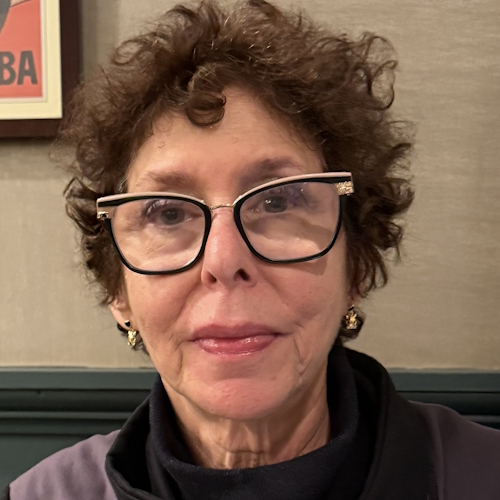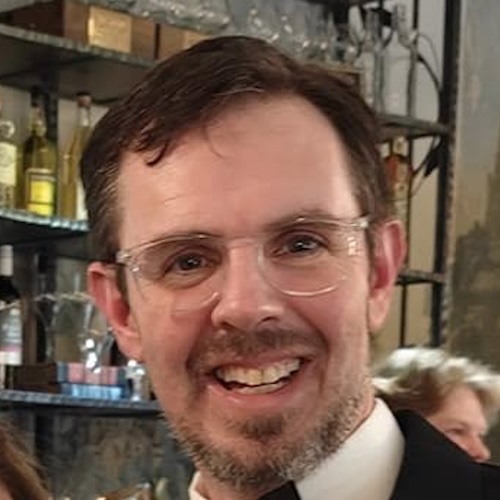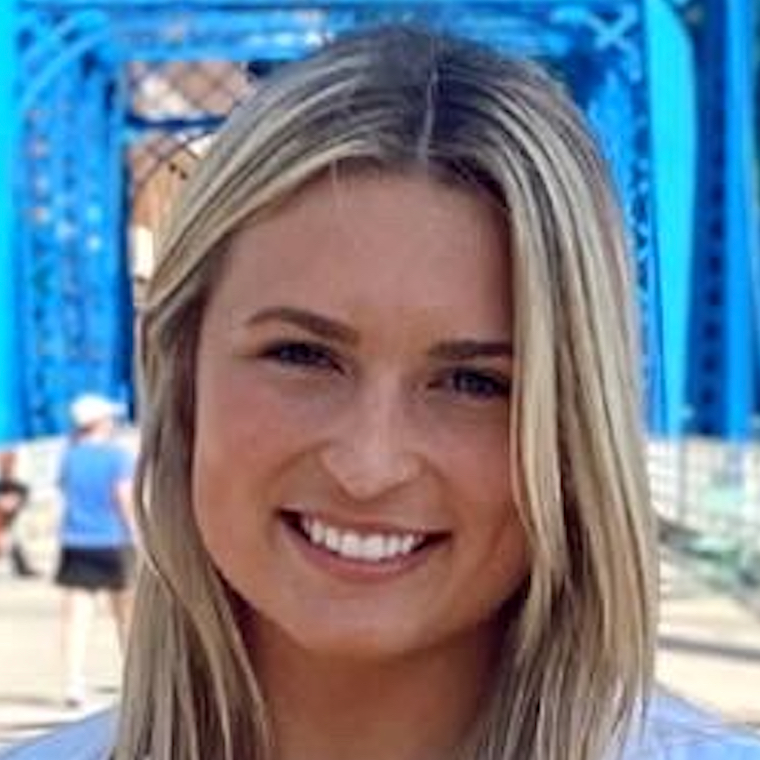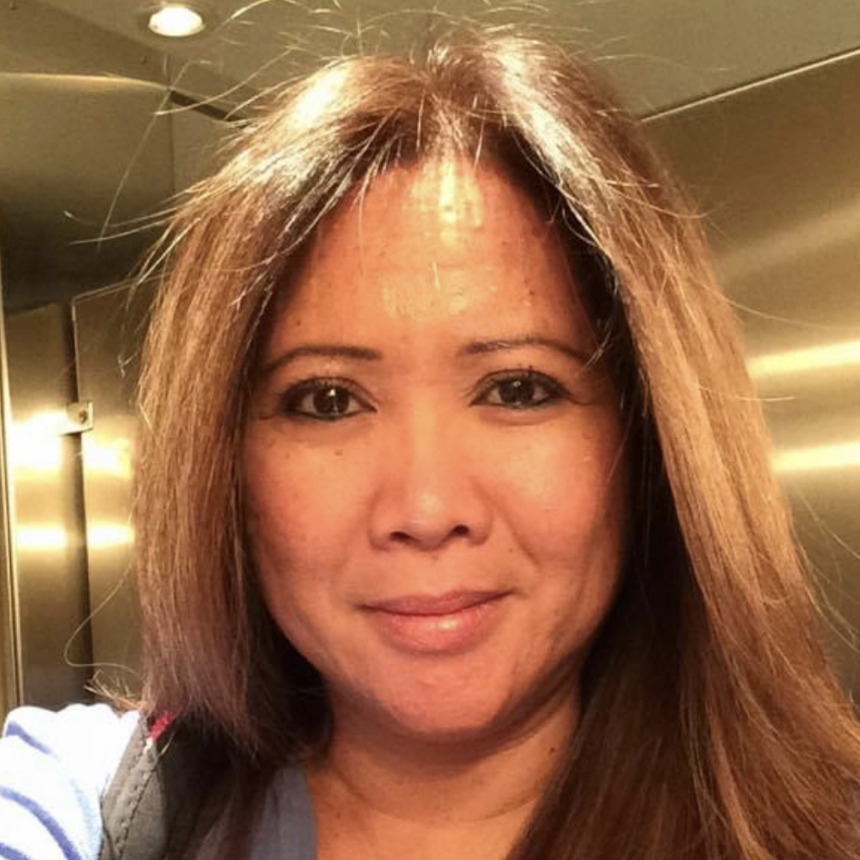Hayley’s AML-M5 Acute Myeloid Leukemia Story
Hayley shares her story of getting diagnosed at 19 years old with acute myeloid leukemia, specifically M5 or acute monocytic leukemia, considered one of the most common AML subtypes.
In her story, Hayley describes undergoing chemotherapy and an allogeneic bone marrow transplant (BMT). Her brother was thankfully a 100% match! She also talks about going through in vitro fertilization (IVF) for fertility preservation, as well as how cancer impacted her marriage and relationships. Thank you for sharing your story, Hayley!
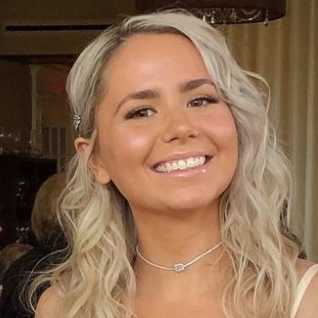
- Name: Hayley A.
- Diagnosis (DX):
- Acute myeloid leukemia (AML)
- Acute monocytic leukemia, or AML M5
- One of the most common subtypes of acute myeloid leukemia
- Age at DX: 19
- Staging: N/A
- 1st Symptoms:
- Fatigue
- Excessive bleeding after oral surgery
- Treatment: Penn Hospital
- Chemotherapy
- IDAra-C
- 2 rounds given continuously for 7 days
- Cytarabine
- 1 round given before transplant
- Post-remission chemo
- IDAra-C
- Transplant
- Bone marrow transplant
- Allogeneic
- Brother was 100% donor match
- Bone marrow transplant
- Chemotherapy
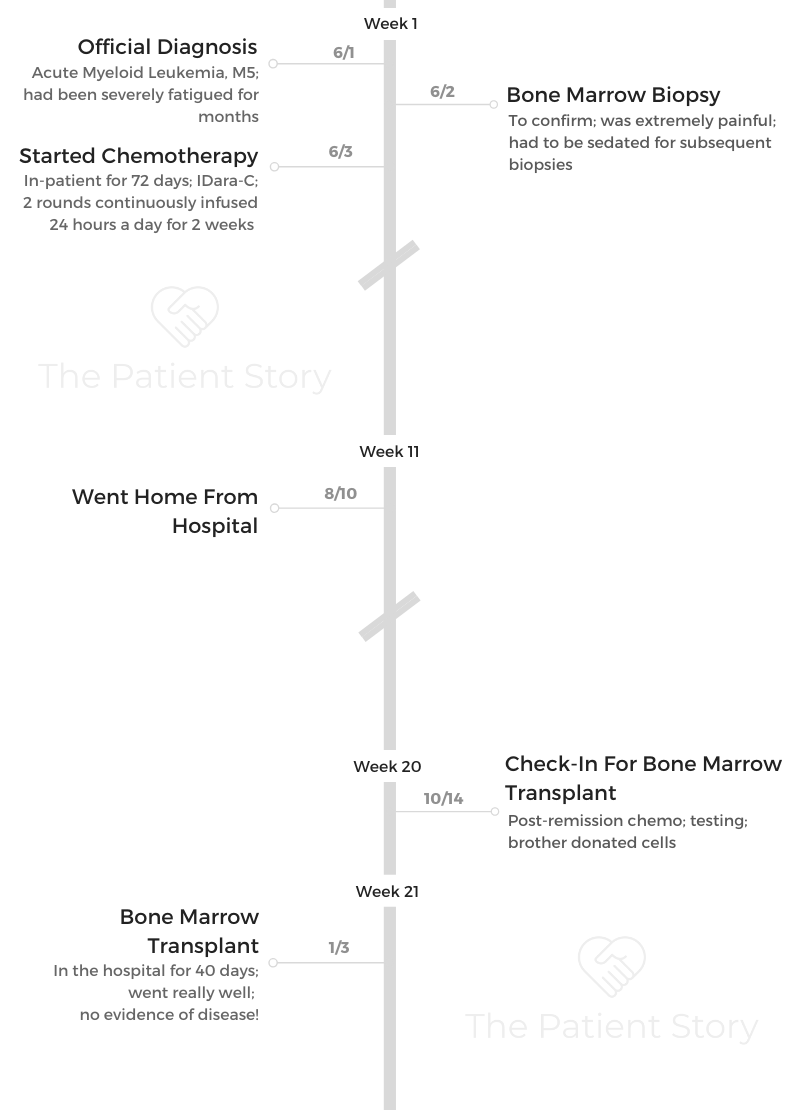
Even though everything seems really scary, it’s so worth it to be able to stand on the other side of it. Whatever it takes to stay alive, do it. I told myself I’d do whatever it took to get to live my life and still be here.
Looking into the future keeps you going. For me, I imagined my life with my husband and what our kids would be like. Hope for the future gives you a reason to keep going.
Hayley A.
This interview has been edited for clarity. This is not medical advice. Please consult with your healthcare provider for treatment decisions.
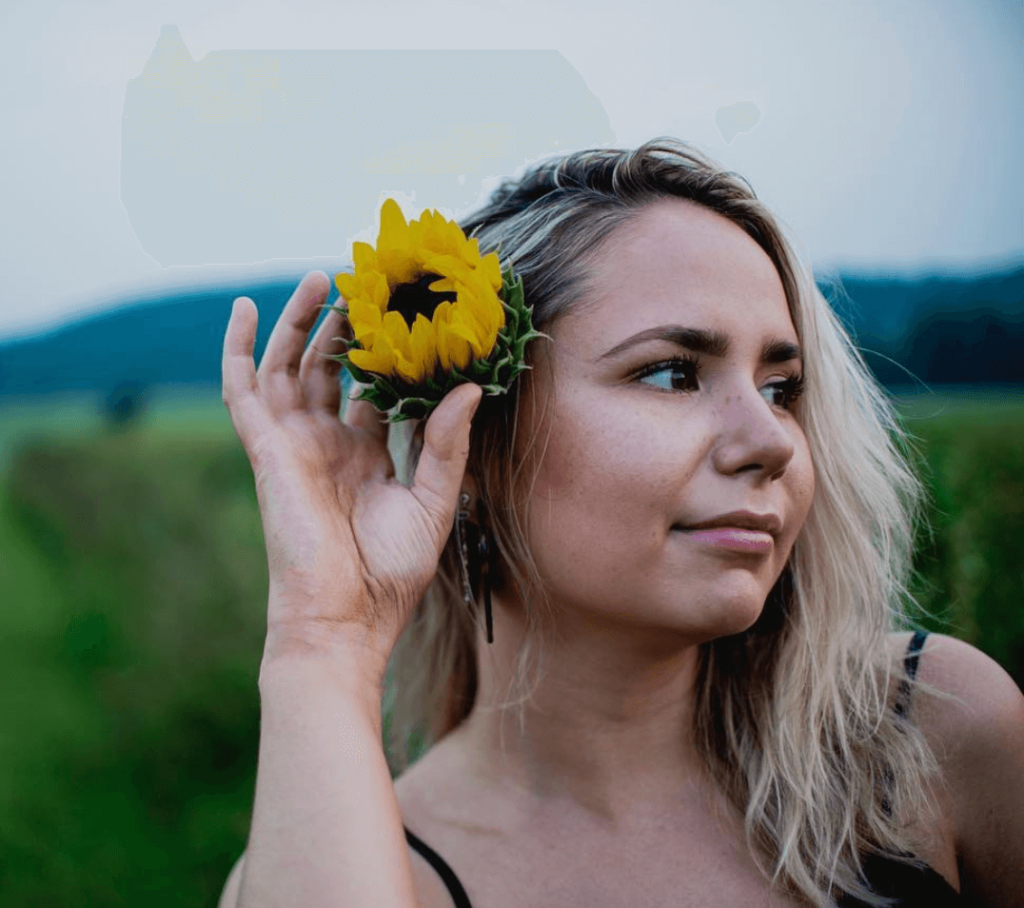
Diagnosis
What were your first symptoms?
I was in my freshman year of college, and I thought I had mono because I was really fatigued. That was pretty much my only symptom for a few months. I’m not just talking “I’m tired after walking” fatigue. I’d be cleaning my room and have to take a nap because I was seeing stars. It was severe.
Then I had a wisdom tooth coming in. My doctors always told me they were growing in straight, so I could leave them in. It was bothering me, so I had it extracted at my dentist’s office one day.
The next day, my entire face swelled up, and I got an infection in my cheek. I had a medical leave from school, and I was in bed for a month with that. None of the antibiotics were working.
Finally, my oral surgeon went in and drained the infection. I was fine for maybe a few days. Then I woke up one day, and my gums were separated from my teeth and my mouth was bleeding.
We called my surgeon, and they said I needed to go to an urgent care and get a blood test immediately. They didn’t say they suspected leukemia at that point. They just told me I needed to get checked out.
What happened at urgent care?
I remember being so tired that morning that I couldn’t get myself dressed. My mom had to help me. My mom and I went in, and they took my blood. When they did, I almost fainted.
We had been waiting for a long time, and I remember saying, ‘Wow, Mom, I think something must be really wrong.’
She was like, ‘Nah, you’re fine.’
Then the doctor came back in and said, ‘You have leukemia. You need to go to the emergency room.’
My white blood cell count was around 31,000.
What happened at the hospital?
They said I needed a blood transfusion right then because my hemoglobin was a 5 when I got to the ER. It was crazy. I did that, and then they transferred me to the big university hospital. I went to Penn.
By the time I got to the hospital on the day I was diagnosed, it was midnight, so they decided to wait and do a bone marrow biopsy the next day. I started treatment in the next 2 days.
Processing a cancer diagnosis
I was pretty emotionally stable. I was glad it was me going through it, because I couldn’t bear to see anyone I love sick. I knew I was strong. I’m not afraid of needles, I have a high pain tolerance, and I wasn’t really scared of any of the treatment.
I just remember thinking that I wanted my family to be okay without me if I ended up dying from this.
I had also just started dating my boyfriend, who’s now my husband, 3 months before I got diagnosed. He came to the emergency room, and he was crying with me.
I looked at him and said, ‘I just want to live for a long time.’ It was all so real. My mortality hit me in my face.
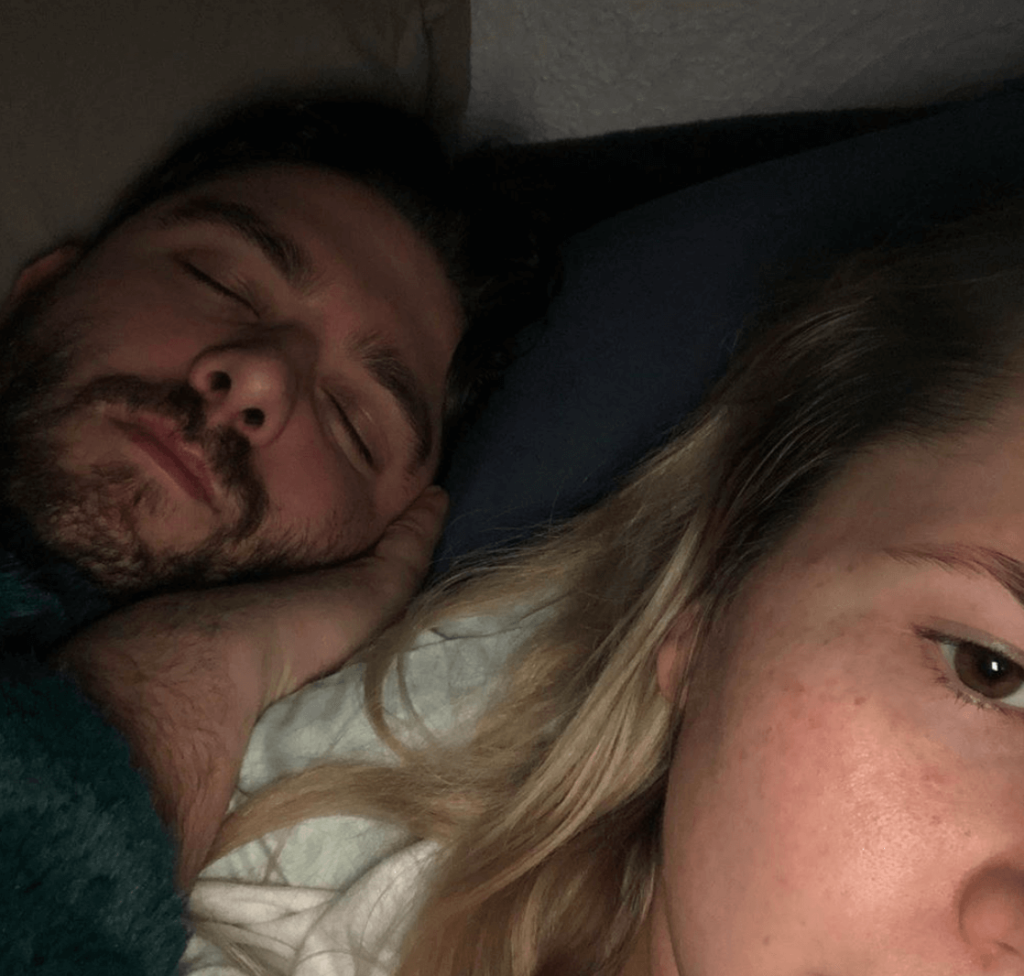
What was the bone marrow biopsy like?
They found out that the leukemia cells in my blood were around 95%. My nurses still say they’ve never seen someone survive a diagnosis that severe.
I’m fine with needles. They don’t really bother me, but I had a pretty grueling experience with the biopsy. They said it was protocol to just do the biopsy bedside in your room.
They numb you, stick a hollow needle in, and pull out some cells. They said I’d feel some pressure and it would be uncomfortable, but they didn’t make it sound like a big deal.
They numbed me up, and I laid on my stomach because they were taking from my hip. When they put the needle in, it was fine. I was numb. I just felt some pressure.
The part that hurt so bad was when they told me to take a deep breath and pulled the bone marrow. I’m not sure if it was because I had so many leukemia cells in my bone marrow or if it just generally hurts like that all the time, but it was the most excruciatingly painful experience I’ve had in my life.
It was every kind of pain. It was like nerve pain, bone pain, everything in one. It was the most primal pain. Granted, I’ve never given birth, but it was so painful. I screamed so loud.
They came in and gave me Dilaudid and Ativan because I was in so much pain. My mom looked at my nurses and doctors and said, “You’re never doing that to her ever again.”
From then on, we just had to sign waivers, and I’d just have them done under sedation.
Chemotherapy
What was your chemo regimen?
I was admitted one night, had the bone marrow biopsy the next day, and started treatment on the day after that. It happened really quick because I was so sick.
My regimen was idarubicin and cytarabine. That’s 24 hours a day continuously for a whole week. You get cytarabine the whole time, and you get idarubicin during the first 3 days. I did one round of that. There was still a lot of leukemia left, so they did that one more time.
It’s one of the harshest chemotherapies you can get, in my understanding. I had 2 of them back to back.
I was in the hospital for 72 days because my counts weren’t coming back up.
I got home on August 10th. They wanted me to rest and gain some weight, because I had lost 30 pounds in the hospital. I went back to the doctor every day for 3 weeks after that to get my levels checked and to get transfusions and platelets if I needed them.
What side effects did you experience from chemotherapy?
The hardest thing for me as a 19-year-old girl with really long blonde hair was losing my hair. I lost a very large part of myself when I lost my hair.
The thing was, you not only feel like you’re dying anymore. You look like you are, too. That’s the hard part about cancer. There’s a sticker on your forehead, basically.
I lost 30 pounds as well. I was about 130 pounds when I started chemo, so I was like 100 pounds or so. It wasn’t horrible. because I’m a pretty tiny person.
The chemo affects your organs, so my kidneys and liver were in distress. I couldn’t eat. I got esophagitis. When I got out of the hospital, I got refeeding syndrome, which hurts really badly in your digestive system, because I was eating real food again.
»MORE: Cancer patients share their treatment side effects
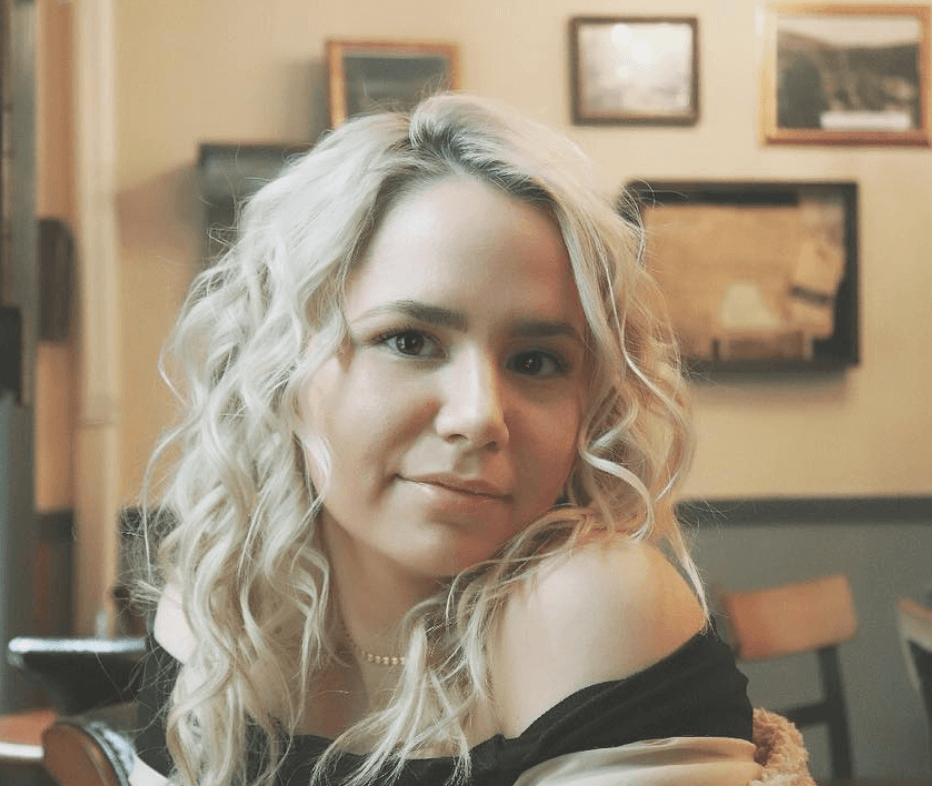
Can you talk more about hair loss?
My hair was really long and blonde, but it got really matted because I couldn’t brush it. My nurses ended up coming in and just shaving it.
My mom said that when they did, whatever light was in my eyes just went out, and I just curled into a ball. That was hard.
I don’t remember the experience of them shaving it really. I was on palliative care at such an early stage in my stay that I really don’t remember, which is probably a good thing.
Bone Marrow Transplant
Preserving fertility before the transplant
After 3 weeks, they told me I needed a bone marrow transplant because my leukemia was really high risk for coming back.
They said, ‘You need a bone marrow transplant in 3 weeks, and you need to come in and freeze your eggs first because it’s going to destroy your fertility.’
It was a whirlwind.
»MORE: Fertility preservation and cancer treatment
What was the preparation for the bone marrow transplant?
My leukemia hadn’t returned, so I didn’t have to have radiation. I did have to do one more round of chemo, though, and that was high-dose cytarabine.
My brother was my donor, and he was a 100% match. He went in and got tested for everything. He had a lot of blood work because they tested for every disease known to man basically.
I had to get tested for everything, too. They tested my heart and my lungs. They had to make sure my teeth were strong enough. They just had to test everything to make sure my body was strong enough for transplant.
My brother donated, and they got a giant bag of bone marrow cells from my brother. They sanitized my entire room right before the transplant as well, because I would be in isolation afterwards.
What was the actual bone marrow transplant like?
I had gone in for post-remission chemo and everything on October 14th. I had my transplant on October 23rd.
The transplant was kind of anti-climactic. They put a port in my chest. I got it just like a regular blood transfusion. It really was uneventful. It was exciting, and we filmed it because I was happy about it, of course, but the event wasn’t a big deal.
»MORE: Hear from a Bone Marrow Transplant specialist
How is the recovery from a bone marrow transplant?
I had to be in isolation for 30 days afterwards. Once my numbers started coming up and I started getting an immune system, I was only in for a week or so after that. I was out just in time for Thanksgiving.
Everyone had to be gowned, gloved, and masked to come see me. My parents weren’t allowed to stay the night with me, but they stayed at a transplant house because of some connections my uncle has. They were a 10-minute walk away from me.
I really don’t have any bad memories of being in isolation. I had visitors. It was okay. It was a better hospital stay than the first time, for sure.
When they recontaminate you, they open your door, and my mom was able to take her gloves off and give me a hug. That was a sweet moment.
Graft-versus-host disease (GVHD)
With a bone marrow transplant, you get graft-versus-host disease. It can either be acute or chronic. I had acute disease of my liver after I tapered off all my anti-rejection medication the following July. I had to have a liver biopsy and be put on steroids, which made me nuts. That was really the only side effect, though.
I also have chronic graft-versus-host in my mouth. They don’t hurt, but it’s almost like white patches in my mouth. It’s like geographic tongue. That’s the only lasting side effect I have besides my fertility, which was destroyed.
»MORE: Explore more on GVHD and what to expect from a medical expert
What’s your follow-up protocol?
If you survive 100 days after transplant, that’s great. Then 6 months and a year are the next milestones. At 3 years post-transplant, you’re considered cured.
They had told me before the transplant that I was in remission, and now I’m allowed to say I’m cured. My cancer isn’t coming back.
I just go in once a year to catch up with my doctor. I’m really close to her and her family now, so we just talk while they take blood work.
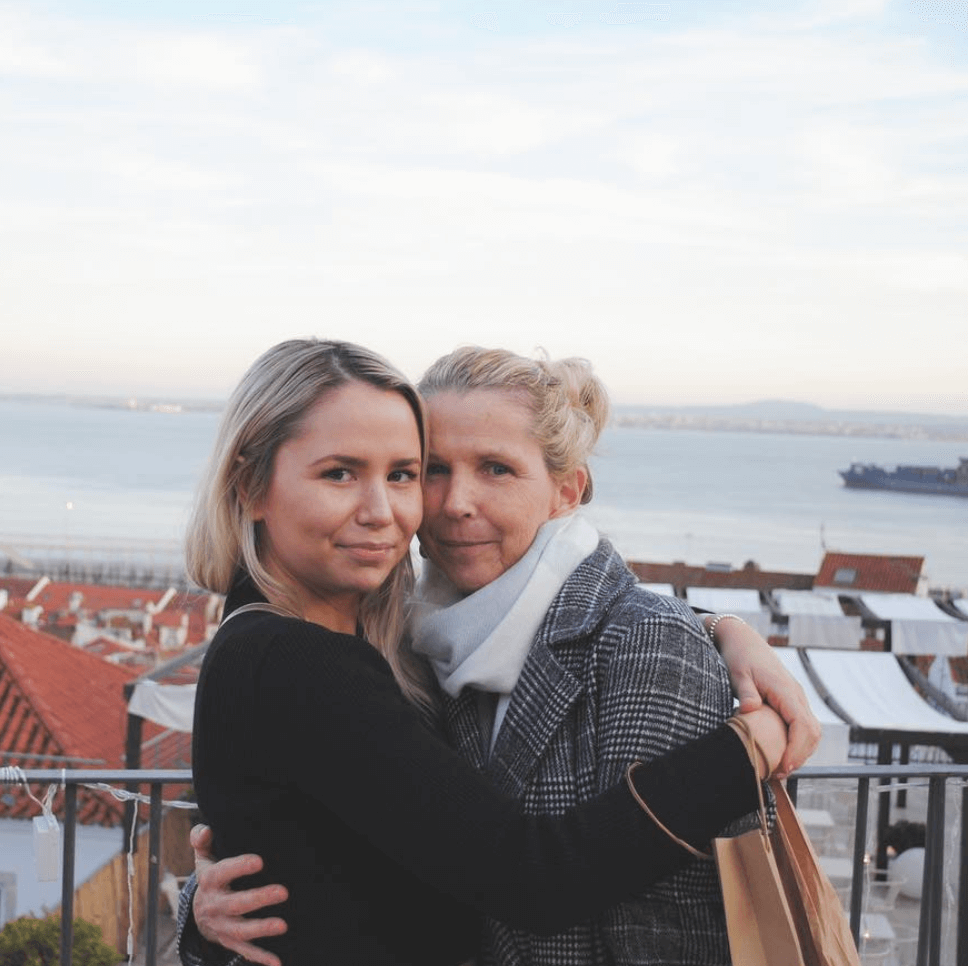
Reflections
Going through in vitro fertilization (IVF)
I had to have shots in my stomach. They were annoying. I just wanted to be normal, but he’d have to give me my injections. If we were visiting friends, we’d have to step out and do my injection, and I didn’t like not feeling normal.
They did the egg retrieval and only got 4. We had those frozen, and they were frozen for 6 years. My husband and I decided we wanted a family [a few years after treatment].
We had 2 immature eggs and 2 mature. We had to do IVF, and that protocol is crazy, too. You have to be on hormones and injections for that as well.
The 2 immature eggs didn’t fertilize, but the the mature ones did. We had 2 embryos. One was being watched in a lab, but it stopped developing, so we lost that one.
I had our other embryo transferred on December 6th, but I miscarried over Christmas. That was really hard and a little traumatic, but I feel a lot better now.
We decided to go the way of egg donation, and we picked our donor. I’m going in for my second embryo transfer in a few weeks. I’ll be able to carry the baby to term and everything because my uterus is still functioning. It’s just my ovaries that got shut down by treatment.
I’m so freaking excited. I want to be a mom so bad. I think about it every day. My husband comes home every day with a new name he loves, and we’re just so excited.
»MORE: Read a patient’s detailed IVF journal
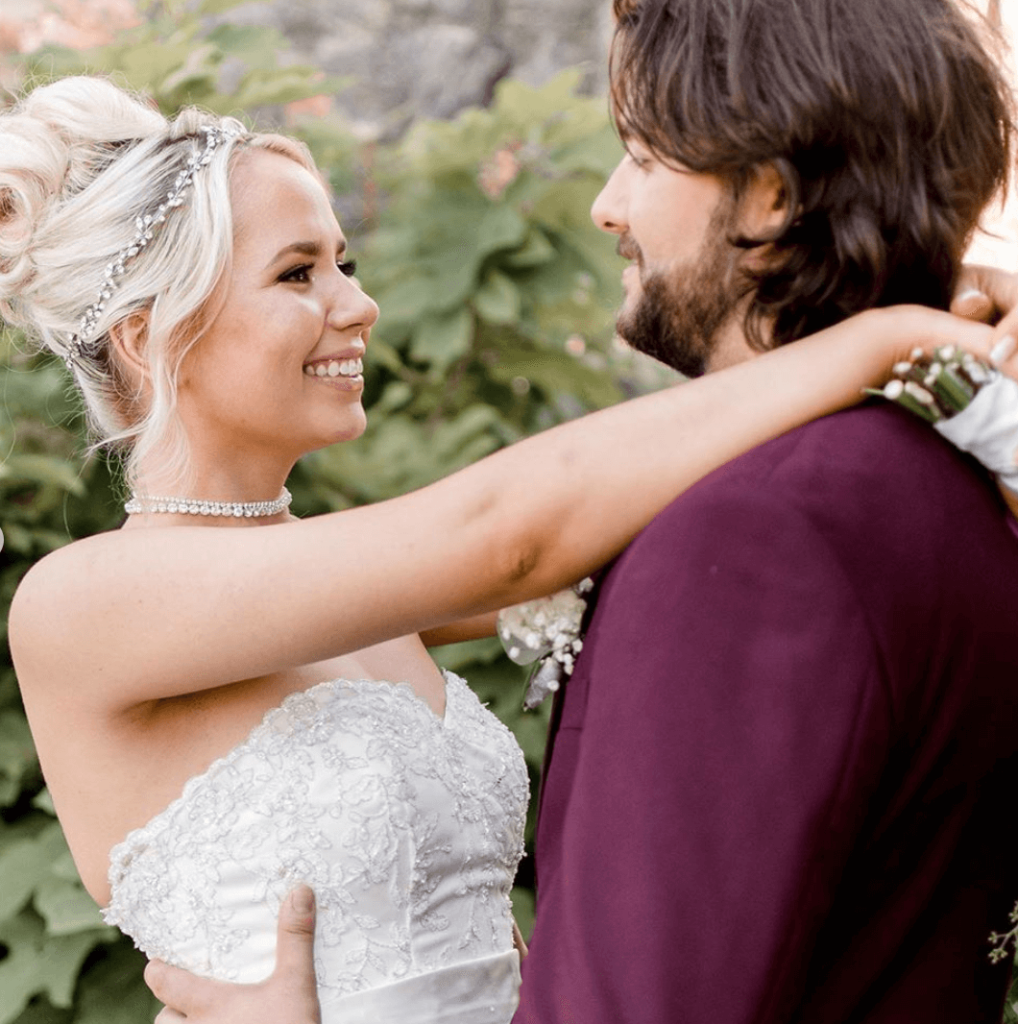
Can you talk about your support system?
My family and I are super close. We moved a lot when my brothers and I were young, so we were always each others’ best friends.
I have 2 older brothers. I’m 25, and they’re 31 and 33. My parents have been together for 36 years. They were all my biggest cheerleaders.
We’re a Christian family, and we have a really strong faith. Our church community was really supportive. My pastor would come visit me. Having that extended church family was really good for us, too.
I had my boyfriend, who is now my husband. We had only been dating for 3 months. He looked at me and said, “I love you. I’m in this with you forever.” He just stuck by my side. He was just wonderful.
Everything medically pointed to me most likely dying from this, from how severe it was to how late we caught my leukemia.
Really what kept my will to live so strong was my family and the fact that I would have a future with my boyfriend. That sustained my entire being.
How was the transition into survivorship?
It’s still so surreal. The fact that I had cancer is such a weird thing for me to think about. I feel like I wear it with pride, though. I never felt like anyone should pity me. It’s just a small part of who I am.
It has ironically been the most beautiful thing that’s happened to me. I love the person I became after that experience. I love the things I’ve accomplished after everything.
I had finished my first semester of college, but I decided I wanted to go to beauty school and do hair and makeup for people because I realized the value of that. It’s not a narcissistic thing. It’s a thing that greatly affects the way you see yourself in the world.
I went to beauty school, and I’ve had great success in that. I’m able to work for myself now as a freelance artist. I also went back to school later and finished my degree in writing and linguistics.
I live this life that I love, and I wouldn’t be living it had I not gotten sick. I wonder if my husband and I would even be together if we hadn’t gone through this. I hope we would have ended up together still, but you never know.
When you go through something like that while you’re still so young and impressionable, it brings out these powerful qualities that may not have come out or may not have come out until later in life. They came out when I was 19.
In ways, I feel a lot more emotionally mature than a lot of people my age. My husband feels the same way. It’s been a really beautiful thing.
Can you talk more about how cancer affected the relationship with your husband?
He’s an actual earth angel. I don’t understand how someone can be as perfect for me as he is. We did have a lot of struggles in dealing with my cancer after the fact. We had a lot of post-traumatic stress.
We argued sometimes, because I was 19 but felt like I was 45. He was 19 and felt that way to an extent, but still wanted to be young. I just couldn’t relate to people my age anymore.
He was in the middle of that. It was kind of uncommon ground between us for a little while until we got older. When you love someone and you see them go through something crazy, it just bonds you forever, though. We just got so close.
One of the most important things he gave me that helped me survive was stable love. He was so good at assuring me that he loved me without exception.
He didn’t just love me if this or that. He just reassured me that it was love no matter what. I never feared he would leave me. I never questioned the way he felt.
»MORE: 3 Things To Remember If Your Spouse Is Diagnosed With Cancer
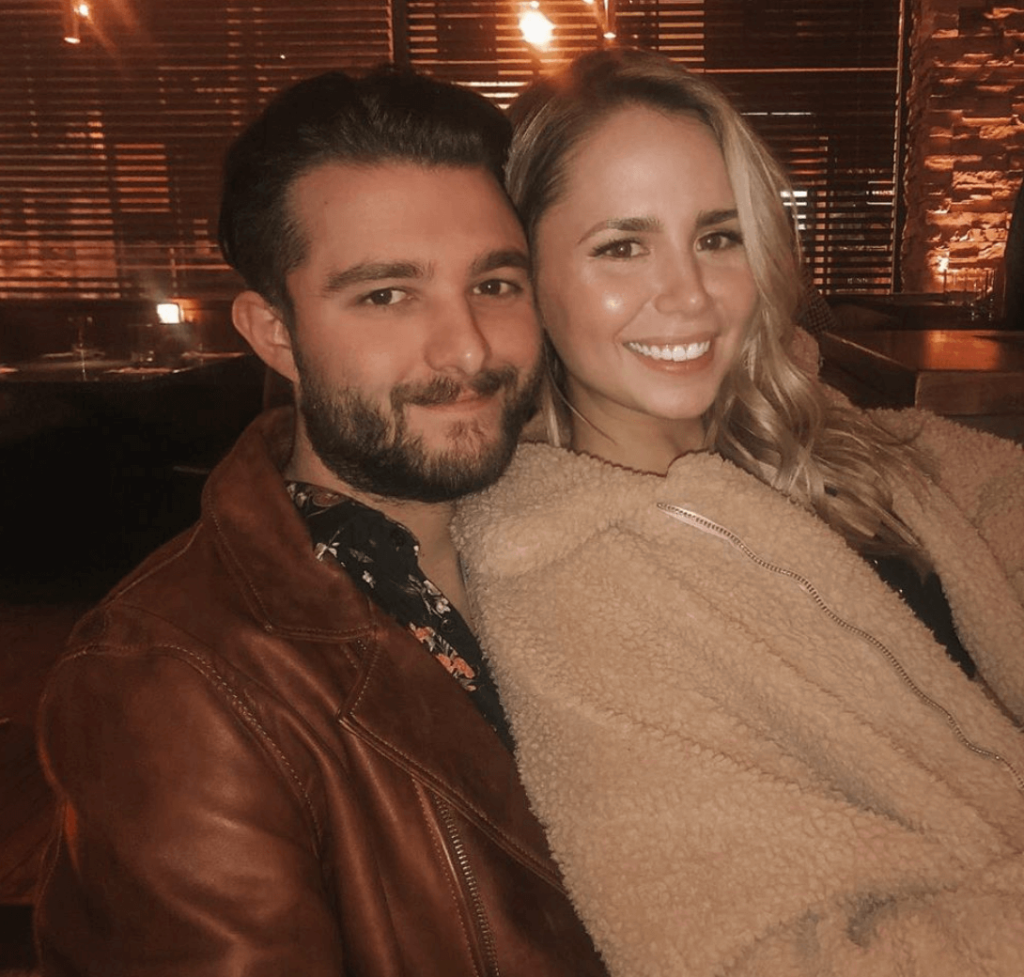
What advice do you have for someone who has just been diagnosed?
Even though everything seems really scary, it’s so worth it to be able to stand on the other side of it. Whatever it takes to stay alive, do it. I told myself I’d do whatever it took to get to live my life and still be here.
Looking into the future keeps you going. For me, I imagined my life with my husband and what our kids would be like. Hope for the future gives you a reason to keep going.

Inspired by Hayley's story?
Share your story, too!
Acute Myeloid Leukemia Stories
Shelley G., Acute Myeloid Leukemia with NPM1 mutation
Symptoms: Fatigue, rapid heartbeat, shortness of breath, low blood counts
Treatments: Chemotherapy, clinical trial, stem cell transplant
Joseph A., Acute Myeloid Leukemia (AML)
Symptoms: Suspicious leg fatigue while cycling, chest pains due to blood clot in lung
Treatments: Chemotherapy, clinical trial (targeted therapy, menin inhibitor), stem cell transplant
Mackenzie P., Acute Myeloid Leukemia (AML)
Symptoms: Shortness of breath, passing out, getting sick easily, bleeding and bruising quickly
Treatments: Chemotherapy (induction and maintenance chemotherapy), stem cell transplant, clinical trials
Grace M., Acute Myeloid Leukemia
Symptom: Headache that persisted for 1 week
Treatments: Chemotherapy, stem cell transplant
